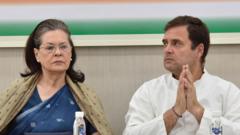The recent death of a 10-year-old rape victim in Bihar has not only drawn attention to the inadequacies in the healthcare system but also reignited discussions surrounding justice for the marginalized. The young girl, who was allegedly raped and brought to Patna Medical College and Hospital (PMCH) in dire condition, died after what her family claims was a significant delay in treatment. Witnesses noted she spent hours in an ambulance before receiving the necessary medical attention.
Outrage in India Over Death of 10-Year-Old Rape Victim Amid Allegations of Medical Negligence

Outrage in India Over Death of 10-Year-Old Rape Victim Amid Allegations of Medical Negligence
The tragic death of a young girl after a reported treatment delay has ignited public anger and sparked discussions on medical infrastructure in India.
The girl had been missing for a short period while playing outside her house before her family found her injured nearby. Following a harrowing chain of events, she was first treated in a local hospital before being transferred to PMCH, where her uncle accused staff of making them wait excessively. However, PMCH officials have dismissed these claims, insisting the transfer was justified due to the nature of her injuries.
Politicians and opposition leaders, outraged by the incident, are intensifying their demands for accountability from the Bihar government, which has been criticized for its handling of the situation. The girl's background reveals the challenges faced by the Dalit community in India, who often endure systemic discrimination.
In light of the growing protests and the condemnation from human rights organizations, questions have emerged about the quality of medical care and the responsibilities of hospital authorities in such critical situations. Despite the protests, government representatives stood by their claims of no wrongdoing, arguing that the admission process is complex and often time-consuming.
Furthermore, this tragic event has shone a spotlight on Bihar’s healthcare challenges, as medical facilities reportedly struggle with inadequate resources and infrastructure. A review of the situation was also prompted by alarming incidents that residents of Bihar continue to face in government hospitals.
As public outcry continues, citizens and activists are calling for immediate responses and improvements in the way such cases are handled in the future, emphasizing the need for compassionate and efficient healthcare services.
Politicians and opposition leaders, outraged by the incident, are intensifying their demands for accountability from the Bihar government, which has been criticized for its handling of the situation. The girl's background reveals the challenges faced by the Dalit community in India, who often endure systemic discrimination.
In light of the growing protests and the condemnation from human rights organizations, questions have emerged about the quality of medical care and the responsibilities of hospital authorities in such critical situations. Despite the protests, government representatives stood by their claims of no wrongdoing, arguing that the admission process is complex and often time-consuming.
Furthermore, this tragic event has shone a spotlight on Bihar’s healthcare challenges, as medical facilities reportedly struggle with inadequate resources and infrastructure. A review of the situation was also prompted by alarming incidents that residents of Bihar continue to face in government hospitals.
As public outcry continues, citizens and activists are calling for immediate responses and improvements in the way such cases are handled in the future, emphasizing the need for compassionate and efficient healthcare services.




















